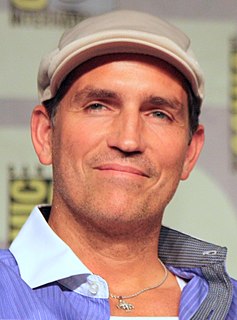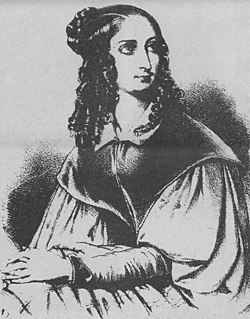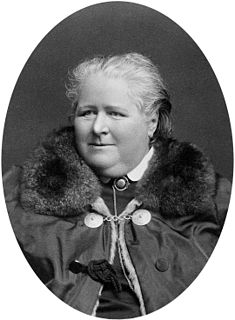A Quote by James Anthony Froude
I think Nature, if she interests herself much about her children, must often feel that, like the miserable Frankenstein, with her experimenting among the elements of humanity, she has brought beings into existence who have no business here; who can do none of her work, and endure none of her favours; whose life is only suffering; and whose action is one long protest against the ill foresight which flung them into consciousness.
Quote Topics
About
Action
Against
Among
Beings
Brought
Business
Children
Consciousness
Elements
Endure
Existence
Experimenting
Favours
Feel
Foresight
Frankenstein
Her
Herself
Humanity
Ill
Interests
Life
Life Is
Like
Long
Miserable
Much
Must
Nature
No Business
None
Often
Only
Protest
She
Suffering
Them
Think
Which
Whose
Work
Related Quotes
Perhaps I will die too, she told herself, and the thought did not seem so terrible to her. If she flung herself from the window, she could put an end to her suffering, and in the years to come the singers would write songs of her grief. Her body would lie on the stones below, broken and innocent, shaming all those who had betrayed her. Sansa went so far as to cross the bedchamber and throw open the shutters ... but then her courage left her, and she ran back to her bed, sobbing.
She sat leaning back in her chair, looking ahead, knowing that he was as aware of her as she was of him. She found pleasure in the special self-consciousness it gave her. When she crossed her legs, when she leaned on her arm against the window sill, when she brushed her hair off her forehead - every movement of her body was underscored by a feeling the unadmitted words for which were: Is he seeing it?
She rested her head against his and felt, for the first time, what she would often feel with him: a self-affection. He made her like herself. With him, she was at ease; her skin felt as though it was her right size.. It seemed so natural, to talk to him about odd things. She had never done that before. The trust, so sudden and yet so complete, and the intimacy, frightened her.. But now she could think only of all the things she yet wanted to tell him, wanted to do with him.
She bent her finger and then straightened it. The mystery was in the instant before it moved, the dividing moment between not moving and moving, when her intention took effect. It was like a wave breaking. If she could only find herself at the crest, she thought, she might find the secret of herself, that part of her that was really in charge. She brought her forefinger closer to her face and stared at it, urging it to move. It remained still because she was pretending... . And when she did crook it finally, the action seemed to start in the finger itself, not in some part of her mind.
The woman who fights against her father still has the possibility of leading an instinctive, feminine existence, because she rejects only what is alien to her. But when she fights against the mother she may, at the risk of injury to her instincts, attain to greater consciousness, because in repudiating the mother she repudiates all that is obscure, instinctive, ambiguous, and unconscious in her own nature.
You must learn her. You must know the reason why she is silent. You must trace her weakest spots. You must write to her. You must remind her that you are there. You must know how long it takes for her to give up. You must be there to hold her when she is about to. You must love her because many have tried and failed. And she wants to know that she is worthy to be loved, that she is worthy to be kept. And, this is how you keep her.
[Keeping kosher was] the symbol of an initiation, like the insignia of a secret brotherhood, that set her apart and gave her freedom and dignity. Every law whose yoke she accepted willingly seemed to add to her freedom: she herself had chosen . . . To enter that brotherhood. Her Judaism was no longer a stigma, a meaningless accident of birth from which she could escape . . . It had become a distinction, the essence of her self-hood, what she was, what she wanted to be, not merely what she happened to be.
It is as great a crime to leave a woman alone in her agony and deny her relief from her suffering as it is to insist upon dulling the consciousness of a natural mother who desires above all things to be aware of the final reward of her efforts, whose ambition is to be present, in full possession of her senses, when the infant she already adores greets her with its first loud cry and the soft touch of its restless body upon her limbs.
She realized how many of her beliefs were either unrealistic or belonged to her deceased parents and her ex-husband. She also realized that her expectations for herself and others were sometimes too rigid. She was trying to live up to what everyone else said was best for her, which made her depressed and hard to be around at times. Once she changed her beliefs about herself and others, she began to smile more and enjoy life.
In my earliest of years, my mother was a huge force in my life. She was for all intents and purposes, a single parent. My father had abandoned us. He was an alcoholic and a physical abuser. My mother lived through that tyranny and made her living as a domestic worker. She was uneducated but she brought high principles and decent values into our existence, and she set lofty goals for herself and for her children. We were forever inspired by her strength and by her resistance to racism and to fascism.
Virtue and vice suppose the freedom to choose between good and evil; but what can be the morals of a woman who is not even in possession of herself, who has nothing of her own, and who all her life has been trained to extricate herself from the arbitrary by ruse, from constraint by using her charms?... As long as she is subject to man's yoke or to prejudice, as long as she receives no professional education, as long as she is deprived of her civil rights, there can be no moral law for her!
For a mother the project of raising a boy is the most fulfilling project she can hope for. She can watch him, as a child, play the games she was not allowed to play; she can invest in him her ideas, aspirations, ambitions, and values - or whatever she has left of them; she can watch her son, who came from her flesh and whose life was sustained by her work and devotion, embody her in the world. So while the project of raising a boy is fraught with ambivalence and leads inevitably to bitterness, it is the only project that allows a woman to be - to be through her son, to live through her son.
So immense are the claims on a mother, physical claims on her bodily and brain vigor, and moral claims on her heart and thoughts, that she cannot ... meet them all and find any large margin beyond for other cares and work. She serves the community in the very best and highest way it is possible to do, by giving birth to healthy children, whose physical strength has not been defrauded, and to whose moral and mental nature she can give the whole of her thoughts.






































